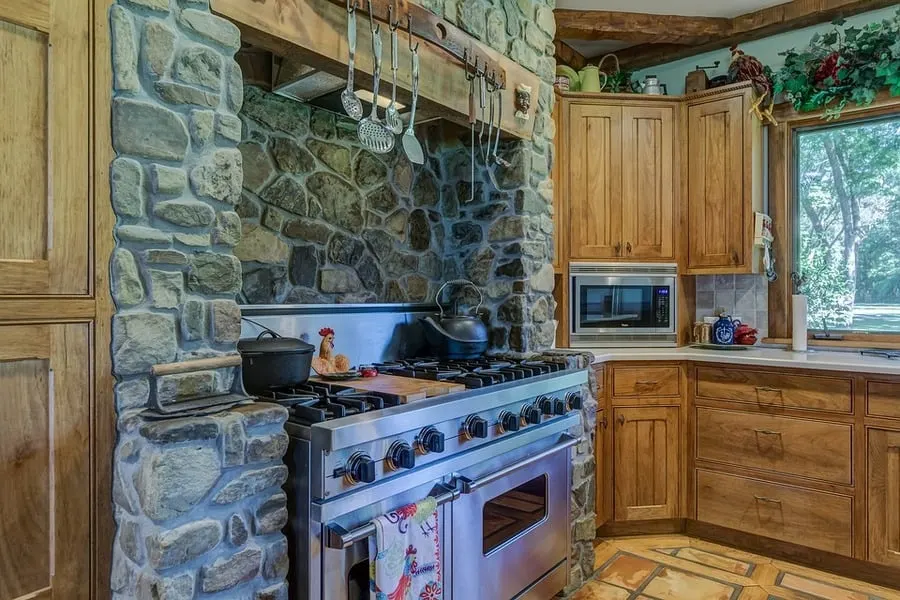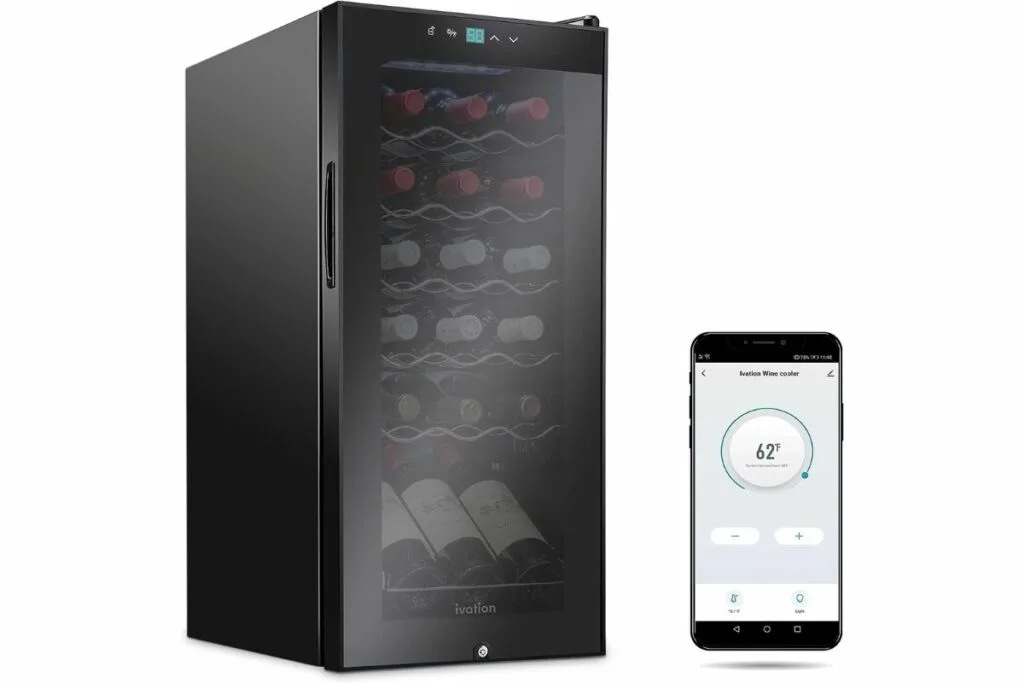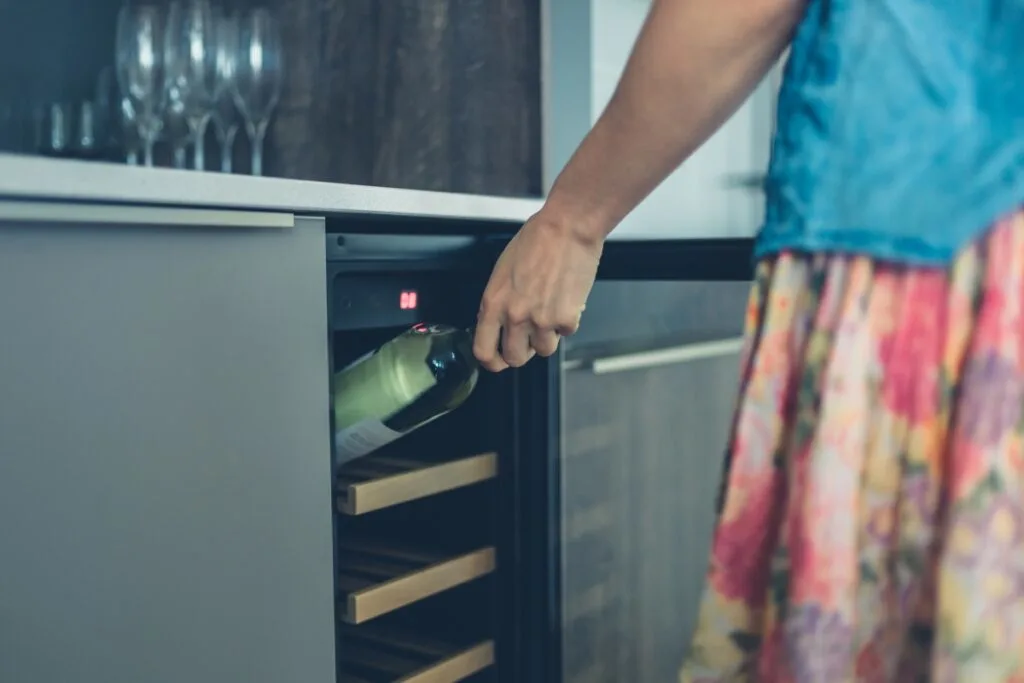As an Amazon Associate, I earn from qualifying purchases with no additional costs for you.
Different wines are at their best when they are kept at specific temperatures. The fridges we keep our food in are often not suitable for wine because they remain at too low of a temperature. Wine fridges are used to keep wine at the proper temperature and humidity. If you’ve ever been around a wine fridge, you may notice a little more buzzing than other fridges.
Are wine fridges noisy? Which are the quietest? Compared to conventional refrigerators, some wine fridges do make louder noises. The level of noise will depend on the type of wine fridge that is chosen, with thermoelectric being the most consistently quiet type. Lower-quality wine fridges tend to be loud because they are always running and working to keep the temperature consistent.
Saying that a wine fridge is ‘noisy’ is relative, considering that they are not particularly loud at 35-45 decibels. The noise is noticeable in comparison to other fridges, but not all appliances. We will look more closely into the noises the wine fridge makes and potential problems that may be occurring if the fridge is particularly loud.

TIP: If you want to check out the best refrigerator for wine storage, I recommend trying out the Avation (18 bottles) compressor refrigerator with Wi-fi smart app control cooling system. You can find this refrigerator by clicking here (Amazon link).
Quietest Inexpensive Wine Fridge for Home Use

This 18-bottle wine fridge is truly quiet as a whisper as far as wine fridges are concerned (Amazon link). I love this particular wine refrigerator. It relies upon thermoelectric cooling technology making it very quiet. In the realm of wine coolers, this is truly one of the quietest models you can buy.
Capable of holding up to 18 full-sized wine bottles comfortably, this wine cooler is ideal for home use. With a temperature range of 54° to 64° F, this fridge is perfectly suited for both white and red wine storage.
You could even store Champagne if you wanted. You should check this awesome wine fridge out on Amazon and read the customer reviews. This fridge has earned very glowing remarks from real wine drinkers.
TIP: Most wines go bad once you pop the cork within a day or so. But a Coravin Wine Preservation system (available for a great price on Amazon) can extend the life of your opened wine for weeks or even months. It is awesome. You should check it out to see if it fits your lifestyle.
Recommendation box: Everything you need to enjoy your wine as much as possible. All recommended products are personally tested and regularly used by experts from this website (Amazon links):
> Ivation Wine Cooler – Energy-efficient wine cooler for 18 bottles with Wi-fi smart app control cooling system.
> Wine Rack – Beautiful, elegant wood rack for up to 7 bottles and the choice of vertical or horizontal storage.
> Durand Wine Opener – Classic vintage wine opener (we like all these classic staff).
> YouYah Iceberg Wine Decanter – The most beautiful and handy wine decanter we personally use.
> Bormioli Rocco Wine Glasses – A set of eight elegant and traditional wine glasses made in Italy.
> Vintorio Wine Aerator – Simple but really useful wine aerator for a reasonable price.
> The Original Vacu Vin Wine Saver – The best wine saver on the market in a package with two vacuum stoppers and two wine servers.
And if you want to become a true connoisseur of wine, we recommend reading the book Wine Folly: The Essential Guide to Wine (Amazon link), where you will find all the information you need about winemaking, wine varieties, flavors, and much more.
Why is My Wine Fridge So Loud?
There are multiple reasons that your wine fridge may be making noise, including the design of the cooling system or deeper issues that could be going on.
TIP: To discover if wine refrigerators are needed for long-term wine storage, check out this great article. To find out the best current wine refrigerators on the market for Champagne storage, check out this informative article.
Type of Cooling System
There are three primary technologies used for wine fridges: electric, thermoelectric, and absorption cooling. The type you choose will not only impact the process by which your wine is cooled and offer specific benefits based on the size and type of collection but also vary in the amount of noise they make.
These are the various cooling system technologies for wine fridges and the level of noise they
produce:
- Electric: These run most similarly to conventional fridges, using compressor technology to decrease pressures and lower temperatures. Electric wine fridges constantly run to maintain a lower regulated temperature than a normal fridge that fluctuates slightly. Running the compressor makes this the loudest of the wine fridge options.
- Thermoelectric: This type of fridge uses an electrical current to heat two metals fused, one producing heat (which is released outside) and the other cooling (into the fridge). Because fewer parts and components are moving, these fridges are much quieter.
- Absorption cooling: This process takes advantage of a heat source to create the energy for cooling to take place. Absorption cooling is the least common of the three but is also a nearly silent option.
Looking more closely at electric wine fridges, these will create the most noise. Not only is the compressor working hard to keep the temperature regulated, but there are other factors at play.
Some wine fridges are designed with multiple zones to keep some areas cooler than others and this will require the use of fans. If more fans are running, there will be more noise.
If noise is a major concern to you, an electro-thermal or absorption cooling fridge will be the best option.
They make less noise because they rely on less machinery working to keep temperatures regulated. These fridges are quieter but are largely dependent on the climate you live in, the amount of wine you plan to store, and how often you want to access it.
TIP: Read this article to discover how cold a wine refrigerator can get. This handy guide explains how to control the humidity in your refrigerator.
Installation Surface and Location

A large influence on the noisiness of your electric wine fridge will depend on where it is installed. The sounds that your compressor wine fridge will make are similar to that of a standard kitchen refrigerator, but many home fridges are installed into cabinets or walls, so the noise is absorbed.
Wine fridges can be freestanding or built-into cabinets, with the latter eliminating more of the noise. Built-in fridges will require more planning, space, and a good circulation system to release heat behind the fridge. The sounds emitted by the fridge will be better absorbed into the cabinets, making noises less noticeable.
If you do choose to use a freestanding fridge, the location can impact the noise level as well. It is recommended that you place the wine fridge on a thick rubber mat or a rug to absorb some sound and vibrations that are emitted from the fridge. This will lower sound levels and also keep the vibrations from irritating the wine.
Our homes have a large impact on the noise we hear from our fridges based on acoustics. The way our home is decorated or designed can make a wine fridge seem much noisier than it is.
Rooms with little sound-absorbing features (think of a room you could hear an echo in if you clapped) will make things sound louder, as the wine fridge’s sounds bounce off the walls.
TIP: Can you put a wine refrigerator next to the oven or store wine in the garage? Read this article and this guide to find out!
Here are a few ways to improve the acoustics and make wine fridges appear quieter in your
home:
- Location: If you are worried about noise and don’t need easy access to the fridge, you could keep the wine in your basement, garage, adjoining rooms, or closets. Try to keep enough space for the fridge to properly circulate and out of the sun not to damage or overwork the fridge. If you do keep it on the house, try to keep it near walls or cabinets that absorb sound.
- Interior Décor: Including sound-dampening materials into your home will absorb sounds coming from a wine fridge. These may be carpets and rugs, paintings, curtains, and upholstered furniture. Homes with large ceilings and windows are prone to more echo and noise, so these additions can help to dampen the noise.
- Absorbing pads: Consider placing your wine fridge on a pad or mat that is specifically designed to eliminate noise and vibration for a quieter result. An electric wine fridge will make noise, but that level is largely dependent on the environment that it is placed in.
Common Wine Fridge Noises
There are some common wine fridge noises you should be aware of so you have a better understanding of what is typical and when you should address potential problems. Here are some common wine fridge noises to look out for:
- Dull hum: If you hear a slight buzzing that is consistent, this should be your fridge working at its normal capacity. This is the sound that you may find noisy based on your environment, but it shouldn’t be too different from your typical fridge.
- Metal clunks or rattling: This is a sign that something is wrong with your wine fridge. The compressor may not be in place and is rubbing against other components in the fridge. You will need to reset the compressor to its proper position.
- Scraping: Check that your fans are in good condition, as they may not be running properly or interacting with other parts of the fridge. You should replace the fans if this happens.
- Light clanking: This may be a result of the vibrations in the fridge causing your wine bottles to touch. This can be an irritating noise and also not great for the wine’s preservation. Consider a mat to eliminate these vibrations.
TIP: The below table lists the current costs to repair a wine refrigerator, while this article explains all you need to know about repairing your wine refrigerator.
| Wine Cooler Part | Costs | Products on Amazon |
|---|---|---|
| Compressor | $100 – $600 | Best Compressors |
| Thermostat | $5 – $30 | Best Thermostats |
| Start relay | $7 – $16 | Best Start Relays |
| Condensor motor | $30 – $250 | Best Condensor Motors |
| Overload protector | $5 – $10 | Best Overload Protectors |
| Cooling fan unit | $10 – $25 | Best Cooling Fan Units |
| Control board | $60 – $250 | Best Control Boards |
| Temperature switching PCB | $30 – $50 | Best PCBs |
| Thermal plate | $30 – $50 | Best Thermal Plates |
A light hum or buzzing noise is expected from a wine fridge, but all other noises should draw your attention. These fixes are minor but have a large impact on the life of the fridge and your wine. To eliminate noise and operating issues, make sure the wine fridge is level when installed or set up.
No matter the type of wine fridge, you should expect to hear some noise while it runs. Compressor wine fridges will be the noisiest but maybe the most suitable for your wine and home environment. Taking advantage of the noise-eliminating tips can make the noises you do hear significantly less noticeable.
TIP: Check out this page for a complete list of wine products and accessories I love. You’ll find my recommendations for wine refrigerators, decanters, and aerators and the best place to buy wine online. Click here to see the complete listing.
